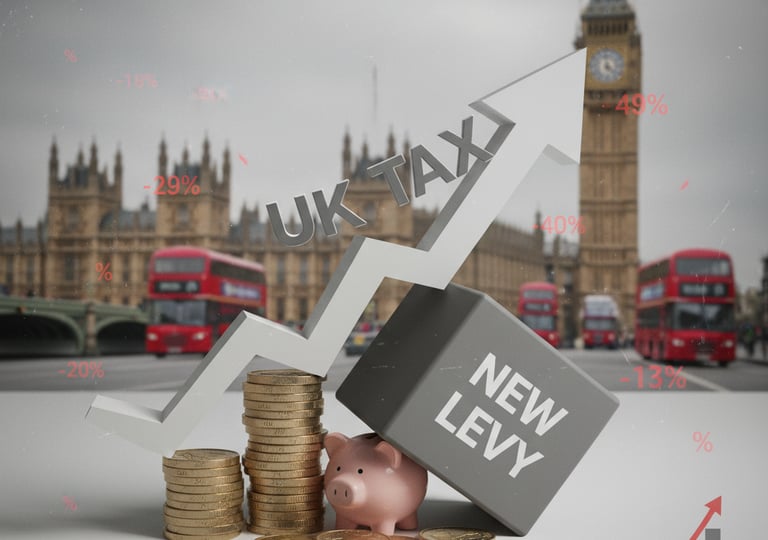
Reeves U-Turn: Income Tax Hike Scrapped
Chancellor Rachel Reeves’ shock U-turn on the income tax rise has triggered political revolt, market turmoil, and split public opinion. The Pound plunged, Labour infighting erupted, and middle earners cheered even as investors panicked. This article explores the chaos unleashed by the Treasury’s sudden reversal — and what it means for Britain’s economic direction.
3 min read



The Announcement: Treasury’s Sudden Reversal
Westminster was blindsided this week as Chancellor Rachel Reeves abruptly abandoned the government’s long-trailed income tax rise — a decision that detonated through political, economic, and media circles with staggering force. What had been sold for months as a cornerstone of fiscal responsibility was, in a matter of minutes, scrapped in a stunning reversal that left analysts scrambling and MPs demanding answers.
Reeves cited “economic fragility” as the catalyst for her U-turn, warning that pressing ahead with a tax rise could tip already-struggling households and businesses into deeper crisis. With markets wavering, consumer confidence faltering, and the aftershocks of previous disruptions still settling, the Chancellor declared that raising taxes now risked suffocating growth when the economy could least afford it.
The move marks a dramatic recalibration of fiscal priorities. What was once a plan to reinforce public finances has now been cast aside in favour of economic breathing room — a gamble that has delighted some and infuriated others. Middle-income families, who feared being squeezed further, welcomed the decision as long-overdue relief. Critics, however, warned that the reversal exposes a government improvising under pressure rather than steering with a steady hand.
But regardless of the spin, one thing is clear: Reeves has torn up her own script, and the political consequences are only just beginning.
Market Chaos: The Immediate Impact on GBP
If the political world was rattled, the financial markets were outright shaken. Within hours of the announcement, the British Pound went into a tailspin, tumbling 2.5% against the US Dollar and more than 2% against the Euro. Screens across trading floors flickered with red as investors scrambled to reassess the government’s fiscal direction.
This wasn’t a gentle correction — it was a sharp, destabilising jolt fuelled by fears that the UK’s economic strategy was veering off course. To global investors, the scrapped tax rise didn’t just signal relief for households; it signalled unpredictability. And in markets, unpredictability is poison.
Analysts described the plunge as a “vote of no confidence” in the government’s long-term stability. In a single afternoon, the Chancellor’s decision transformed from a domestic policy pivot to an international financial warning shot. The message was clear: if economic strategy can change overnight, investor confidence can evaporate just as quickly.
Political Angle: Internal Labour Revolt
Inside the Labour Party, the fallout has been nothing short of explosive. What began as murmurs of discomfort erupted into open rebellion as factions within the party clashed over Reeves’ abandoned tax plan. The income tax rise had already been contentious — now, its cancellation has exposed deep ideological fault lines.
Progressives accused Reeves of retreating from Labour’s commitment to funding public services, while moderates argued the tax rise was political suicide waiting to happen. Senior MPs, veterans of past Labour battles, reportedly applied fierce pressure behind closed doors, warning that pressing ahead with the increase would alienate the working-class voters who delivered Labour’s recent surge.
Sources within Westminster described heated meetings, tense briefings, and a party leadership scrambling to reassert control. The revolt has sparked uncomfortable questions: Who truly sets Labour’s economic direction — the leadership, the membership, or the loudest internal faction?
What was meant to be a straightforward fiscal measure has instead ignited a struggle for Labour’s identity. Unity, once one of the party’s selling points, now looks increasingly fragile.
Public Sentiment: Middle-Earners’ Relief vs. Market Instability
While politicians argue and markets reel, ordinary citizens are caught in the middle. For millions of middle earners, the tax U-turn triggered an immediate and heartfelt wave of relief. After years of rising costs and stagnant wages, the thought of yet another financial squeeze had been a breaking point. Reeves’ reversal felt, to many, like a rare reprieve.
But the relief has been overshadowed by mounting public anxiety about the chaos unfolding in the markets. The plunging Pound, warnings from economists, and talk of higher borrowing costs have stirred fears that short-term comfort may lead to long-term pain.
Business owners worry about instability. Investors feel rattled. Families who cheered the scrapping of the tax rise now wonder what the economic fallout will mean for mortgages, prices, and job security.
The mood across the country is conflicted — a blend of gratitude, caution, and a simmering question:
Is this the moment the government regained control, or the moment it lost it?
As Chancellor Reeves braces for the political and economic storm ahead, she faces a stark challenge: keep the public on her side while convincing the markets she hasn’t lost her nerve. Whether she can satisfy both remains the defining test of her leadership.

Contact
Subscribe to our newsletter
Stay informed with global news updates on our main site
www.worldpressfreedom.com
© 2012 - 2025 WPF News
Michael Bosworth, Founder,
CEO & Chief Content Officer
